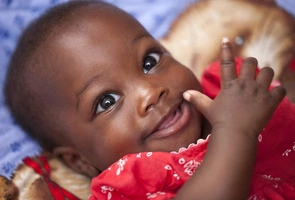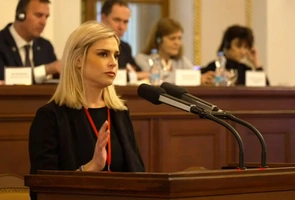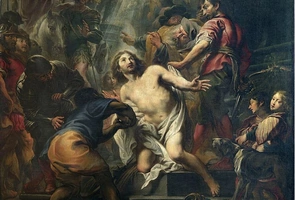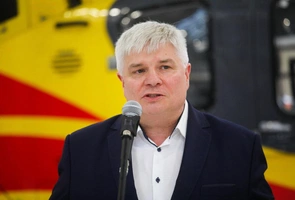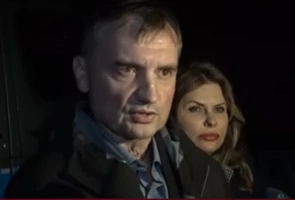Wspólne oświadczenie Konferencji Episkopatów Polski i Niemiec (wer. angielska)
Joint Statement of the Polish and German Bishops' Conferences on the occassion of the 40th anniversary of the Exchange of Letters between the Two Bishops' Conferences in 1965 (21.09.2005)
Soon we will be celebrating the fortieth anniversary of the well-known Address of the Polish Bishops to Their German Brothers in Christ's Pastoral Office. In it, the Polish Bishops invited their German brethren to participate in celebrations commemorating one thousandth anniversary of the baptism of Mieszko I in 966 and twenty years after the end of horrible experiences of World War Two called them to dialogue, reconciliation and brotherhood. Their moving and outright prophetic words: We forgive and ask for your forgiveness had a significant impact on the course of history. The German Bishops, who on the occasion of the conclusion of the Second Vatican Council were in Rome at that time, as were their Polish brethren, responded to the Address a few days later and wrote, among other things: It is with brotherly respect that we accept the extended hands. May the God of peace through „Regina pacis” cause that our hands are never again untied by the spectre of hatred.
II.
Four decades after the exchange of letters between the two Bishops' Conferences, sixty years after the end of World War Two, and ten years after the two Conferences issued their first joint letter, we, the Bishops, in great thankfulness wish to remind all people of goodwill in Poland and in Germany about this breakthrough event. By their letters our predecessors, acting in a Christian spirit, took a decisive step towards a new beginning in mutual relations between our two nations. In an extremely difficult political situation, thanks to this sign of readiness to forgive, they laid down solid foundations for the work of the Polish-German reconciliation.
We are recalling this brave act not only because we wish to show how highly we regard it. We are also so doing it because, like our Predecessors before us, we, too, feel responsible for the process of understanding, reconciliation and Polish-German friendship today. We are concerned when we witness that the memory of the grim moments in our common history evokes not only a spirit of reconciliation, but also tears apart at the still unhealed wounds and rekindles the phantom of settling wrongs. Some representatives of political and public life recklessly tear at the still hurting wounds of our two nations' history. Others, openly and even ruthlessly try to use them for personal or political reasons. The fortieth anniversary of the exchange of letters gives us an opportunity to oppose with full strength this irresponsible attitude in our mutual relations. This also refers to the actions of those who undertake them in the name of justice. John Paul II admonished the Church as a whole against a false understanding of justice, when as Archbishop of Kraków, he co-authored the Address. He wrote: very often programs which start from the idea of justice (...), in practice suffer from distortions. (...) The experience of the past and of our own time demonstrates that justice alone is not enough, that it can even lead to the negation and destruction of itself, if that deeper power, which is love, is not allowed to shape human life in its various dimensions (Dives in misericordia 12).
We can experience the gift of reconciliation only when we sincerely admit the whole truth, when we regret our offences and are forgiven. For this reason we recall the statement found in the Joint Declaration of the Polish Bishops' and German Bishops' Conferences of December 1995 on the occasion of the 30th anniversary of the exchange of letters in 1965: Only the truth will set us free; truth that does not embellish anything and does not omit anything, does not pass in silence over anything and does not demand satisfaction for wrongs committed (cf. J 8,32). It is in this spirit, in confronting the fact of Nazi Germany's criminal war invasion, the enormous scale of wrongs which Germans had inflicted on Poles as a result of that war, and the wrongs that Germans had suffered when they had been uprooted from their homeland, we jointly repeated: We forgive and ask for forgiveness. Only when we admit the whole truth and at the same time renounce the idea of each of us listing our wrongs, will we avoid a one-sided view of our own history and be able today to pave the way for seminal cooperation in the future. Such attitude brings forth a readiness to look at one's own history and the present time not only through our eyes, but also through the eyes of the other person. We are well aware that this road requires a great deal of joint efforts. To be able to walk this road, goodwill and reliability are needed in our mutual contacts. However, only if our two nations are ready to reconcile can we have long-lasting peace, one that will bring about the much sought after sense of security and genuine friendship to both Poles and Germans.
III.
The brave evidence of the Christian address of reconciliation of 1965 has reverberated far beyond the area of the German-Polish context. Supported by Christ's faith trusting in God's Mercy, the Bishops, aware of the weight of the horrible burden of war crimes, lawlessness and suffering, were able to break the walls that still divided us during the Cold War period and show anew a vision of more fully uniting Europe. They bore witness to the fact that Christian foundations cannot be permanently dominated by injustice and violence. Looking back at the events that occurred in Poland, especially at the birth of the independent movement of Solidarność 25 years ago, and the development of relations between our two nations, today we understand better that the Bishops in their will to overcome hatred and animosity between Poles and Germans had also made a contribution to the ending of bondage and the division of the European continent.
Since that time, our two countries have witnessed many developments. Totalitarian power and loss of national sovereignty have been overcome by peaceful means. Today, Poland and Germany together participate in the process of European integration. By so doing, our two nations bear a telling witness that the last word does not have to belong to war, hatred and violence. We state with emphasis: Germans and Poles should never again direct their spiritual and material potential against each other. Rather it is their duty to harness that potential for the good of all peoples of a uniting Europe and to strengthen its Christian identity. This task will be accomplished only when Germans and Poles understand that our common history is also full of good aspects that unite them. Today, when after a Polish Pope, the successor of St. Peter is Pope Benedict XVI, the Son of the German Nation, both nations experience in a particular way how great and profound the bond of friendship and cooperation can be, when they allow themselves to be guided by the same Christ's Spirit, the Spirit of reconciliation and peace. These bonds should be the subject of particular pastoral care of the young people. The experience of faith that we witnessed during the 20th Youth Day in Cologne should be continued by young Poles and Germans. For this reason the Bishops of both countries wholeheartedly encourage the ministers and young people to develop forms of cooperation that will help to sustain the spirit of mutual goodness and friendship.
As Christians, Poles and Germans today confront new challenges, primarily that of defending life, marriage and the family. Similarly the area of bioethics, which is often distorted and at the risk of egoistic interests of scientific communities and business circles confronts us with new tasks. For the good of future generations, we need to shape our continent together in the Christian spirit so it becomes an environment where life is respected and the inalienable dignity and genuine freedom of man are safeguarded. Out of our concern for the shape of Europe, we wish to contribute to the building of peace in the world. This also relates to Europe's credible involvement in future contacts with countries in the East and South.
We, the pastors of the Catholic Church, thankful to God, the sole Lord of history, who entrusted Poles and Germans with the gift of reconciliation as a sign of hope for our times, encourage all faithful and all people of goodwill of our two nations, to bravely confront new challenges. Like our Predecessors forty years ago, we, too, trustingly commend ourselves to the merciful and loving intercession of God's Mother our common Advocate.
Fulda, 21 September 2005.
Wrocław, 24 September 2005.
| Archbishop Józef Michalik | Cardinal Karl Lehmann |
| Metropolitan Bishop of Przemyśl | Bishop of Mainz |
| Chairman The Polish Bishops' Conference | Chairman The German Bishops' Conference |
opr. mg/mg

Polecane
-
Parlament Europejski zdecydował: międzynarodowe macierzyństwo zastępcze ma zostać zakazane
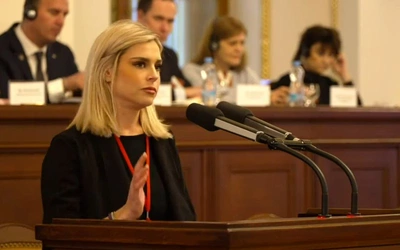
-
Patron rycerzy i Wielki Męczennik. Dziś wspominamy św. Jerzego
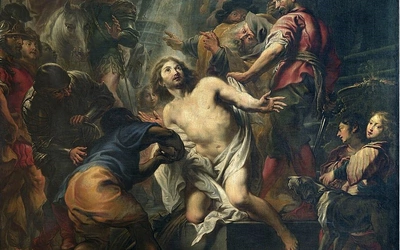
-
Powstanie CPK oddala się. Resort „weryfikuje prognozy”
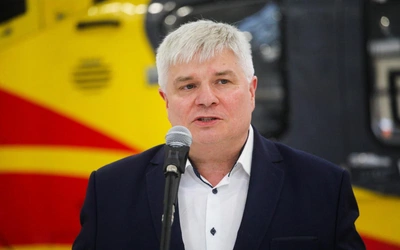
-
„Proces nie przebiega dobrze”. Komplikacje zdrowotne byłego ministra
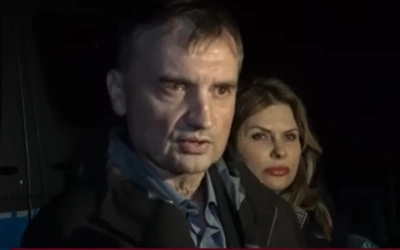
-
Bp Ważny: wiernym w Sosnowcu chciałbym powiedzieć „Pokój wam”
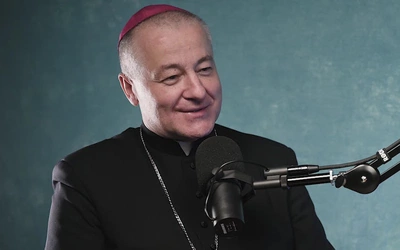
Najnowsze
-
1 Parlament Europejski zdecydował: międzynarodowe macierzyństwo zastępcze ma zostać zakazane
-
2 W drodze do domu czy zamknięci w doczesności?
-
3 Mikrolasy Miyawaki – japoński koncept ratunkiem dla polskich miast
-
4 Gdy wracają stare uprzedzenia. Eurodeputowana uwiarygadnia prostacki antyklerykalizm
-
5 Patron rycerzy i Wielki Męczennik. Dziś wspominamy św. Jerzego
-
6 Powstanie CPK oddala się. Resort „weryfikuje prognozy”
-
7 „Proces nie przebiega dobrze”. Komplikacje zdrowotne byłego ministra
-
8 Bp Ważny: wiernym w Sosnowcu chciałbym powiedzieć „Pokój wam”
-
9 Watykan chce odnowić porozumienie z Chinami. Układ pozwala, by komuniści wpływali na nominacje biskupów
-
10 Być ewangelistą
Najpopularniejsze
- Na podstawie Ewangelii
- Po śladach miłości
- Blok gazowo-parowy w Rybniku z decyzją o pozwoleniu na budowę
- Praca Opiekunki w Niemczech: Wyzwanie Pełne Satysfakcji
- Ekspercki raport PAP – jak dwie dekady członkostwa w UE przeobraziły Polskę
- Być ewangelistą
- W drodze do domu czy zamknięci w doczesności?
- Do godz. 17:00 głosował co trzeci Polak. Lokale wyborcze będą otwarte do godz. 21:00
- Bacowie rozpoczęli sezon u Gaździny Podhala. Owce muszą poczekać na cieplejszą pogodę
- W Chorzowie na mecz ligowy przyszło 50 tys. kibiców. To rekord XXI w.
-
Bp Ważny: wiernym w Sosnowcu chciałbym powiedzieć „Pokój wam” Ta decyzja była dla mnie pewnym zaskoczeniem, ale z drugiej strony, kiedy Ojciec Święty proponuje, nie zwykłem odmawiać, więc zgodziłem się w duchu takiego zaufania i wiary – powiedział nowy biskup sosnowiecki. Wiadomo już, kiedy bp Ważny rozpocznie posługę w Sosnowcu.
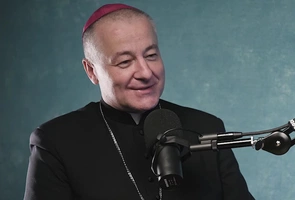
-
Watykan chce odnowić porozumienie z Chinami. Układ pozwala, by komuniści wpływali na nominacje biskupów Stolica Apostolska zamierza jesienią bieżącego roku odnowić umowę z komunistycznymi Chinami o nominacji biskupów – odpowiedział na pytanie portalu LifeSiteNews kardynał Pietro Parolin. Emerytowany biskup Hongkongu kardynał Joseph Zen Ze-kiun nazwał tę umowę „niewiarygodną zdradą”.

-
„Naruszenie prawa do obrony”. RPO interweniuje w sprawie ks. Olszewskiego Zażalenie na areszt powinno być rozpatrzone „niezwłocznie”. W przypadku szefa Fundacji Profeto termin wyznaczono na 30 kwietnia. To blisko 4 tygodnie od chwili aresztowania.
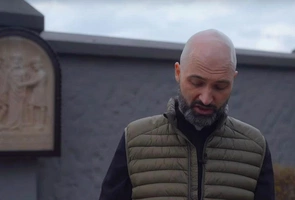
-
Ponad 500 uratowanych dzieci. To bilans tegorocznej akcji 40 Dni dla Życia Odnotowano także kilka nawróceń i zamknięcie sześciu przychodni aborcyjnych. Kampania 40 Dni dla Życia odbywa się dwa razy w roku od 2007 r.
